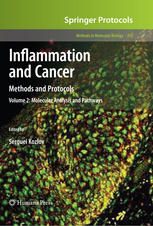

Most ebook files are in PDF format, so you can easily read them using various software such as Foxit Reader or directly on the Google Chrome browser.
Some ebook files are released by publishers in other formats such as .awz, .mobi, .epub, .fb2, etc. You may need to install specific software to read these formats on mobile/PC, such as Calibre.
Please read the tutorial at this link: https://ebookbell.com/faq
We offer FREE conversion to the popular formats you request; however, this may take some time. Therefore, right after payment, please email us, and we will try to provide the service as quickly as possible.
For some exceptional file formats or broken links (if any), please refrain from opening any disputes. Instead, email us first, and we will try to assist within a maximum of 6 hours.
EbookBell Team

4.8
104 reviewsAccording to the most recent clinical oncology data, one out of seven newly diagnosed malignancies worldwide result from infection and chronic inflammation in conjunction with cancer. In Inflammation and Cancer: Methods and Protocols, expert researchers deliver a systematic guide to techniques addressing various aspects of experimental cancer biology, selectively focused on inflammation-mediated tumorigenesis, while promoting improvisations on a per-case basis. Volume 2, Molecular Analysis and Pathways is devoted to an extensive description of experimental strategies aimed at investigating the molecular cross-talks between components of cell signaling chains and their ramifications in diagnostic development and drug target discovery. Written in the highly successful Methods in Molecular Biology™ series format, chapters include brief introductions to their subjects, lists of the necessary materials and reagents, step-by-step laboratory protocols, and a notes section, which examines tips on troubleshooting and avoiding known pitfalls.
Comprehensive and cutting-edge, Inflammation and Cancer: Methods and Protocols promises to serve as a vital guide and resource for investigators and clinicians working toward the goal of combatting the estimated 2, 200 inflammation-related oncogenesis fatalities occurring every day.